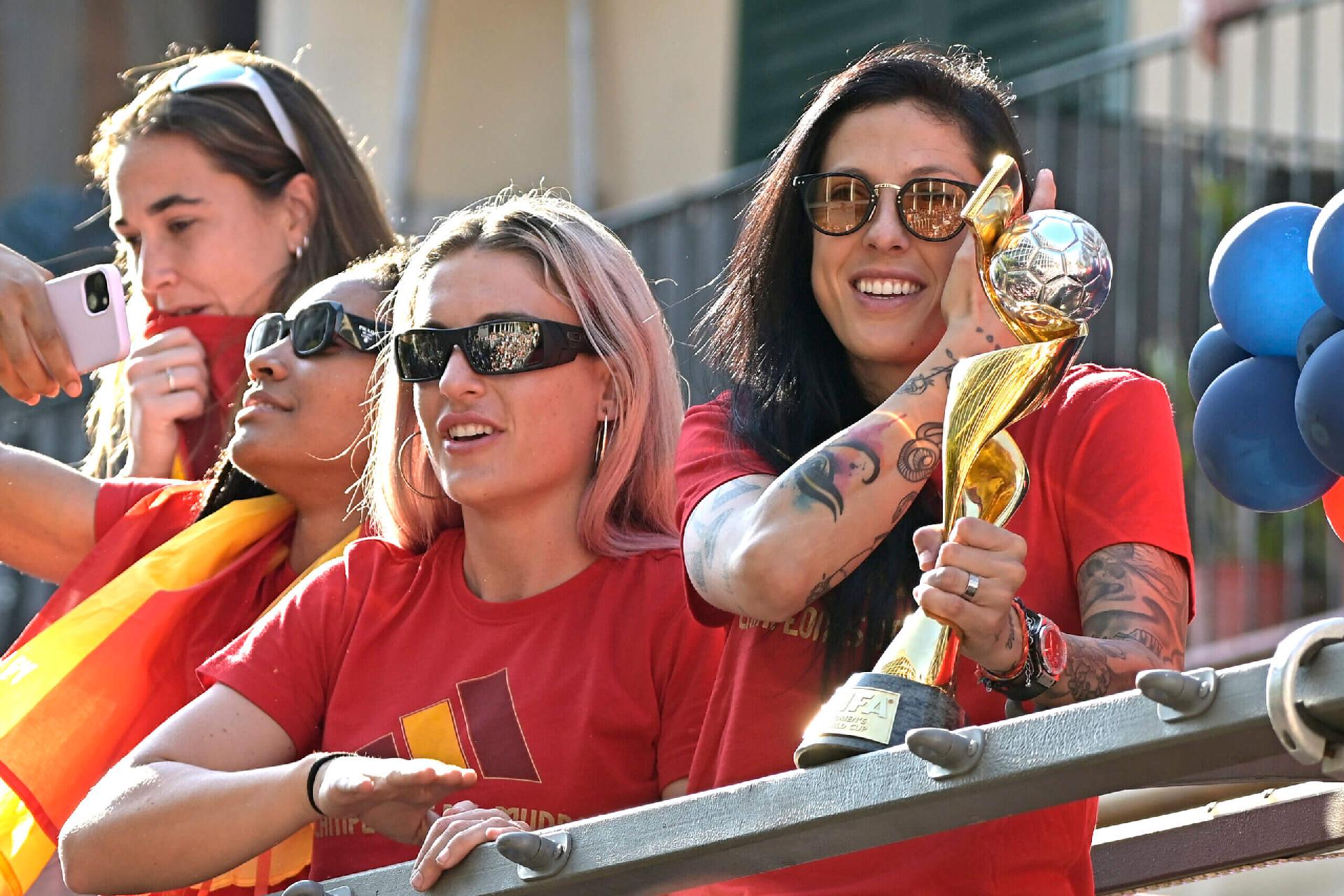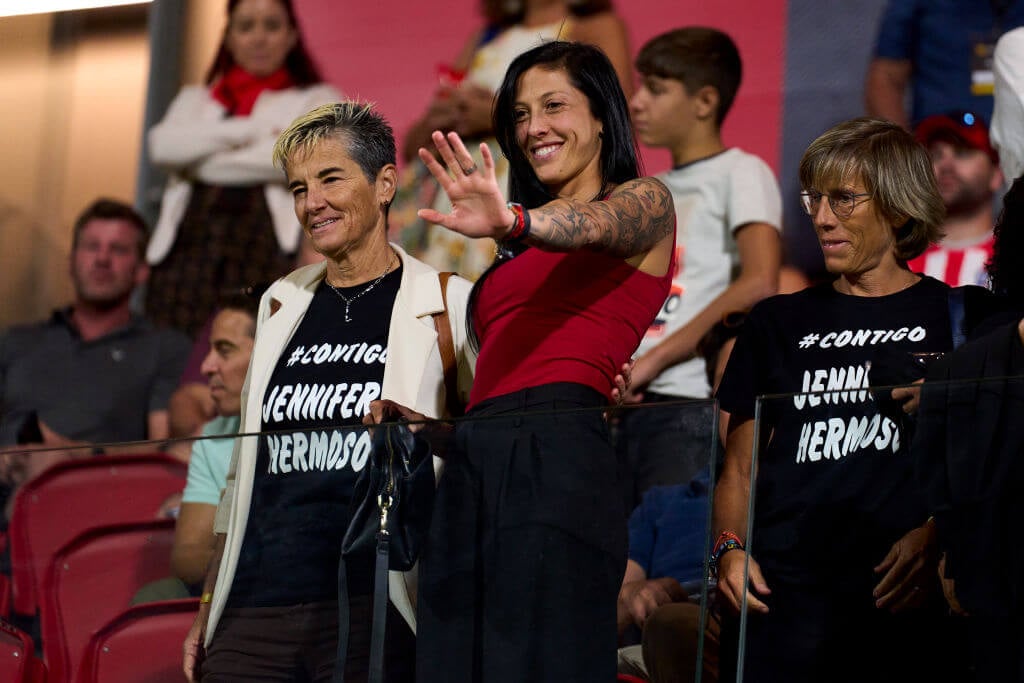Jenni Hermoso: Record goalscorer, serial swearer and icon of Spanish sport
autty 2023-08-30 17:30:17 评论
Ask anyone today who Jenni Hermoso is and their answer would probably sound something like this: she's the Spanish player Luis Rubiales kissed without consent after Spain won the Women's World Cup; the icon of 'Se acabo', the Spanish 'Me Too' movement.

If the same question had been asked a few months ago, the answers would likely have been very different.
Hermoso is the top goalscorer in the history of both the Spain and Barcelona women's teams. Over the years, when asking defenders who was the most difficult opponent for them to face, they'd always mention her, and if you asked her fellow forwards which player they admired, Hermoso's name would come up a lot, too.
Whether it was at Barcelona, who she played for in seven seasons across two spells before leaving last summer, or with Spain, for whom she won her 100th cap during the recent World Cup, Hermoso has always been known as the soul of the team, the one who is always cracking jokes. The 33-year-old is the DJ in the dressing room, a music lover who is especially fond of the Spanish tecno-rumba group Camela.
Hermoso got her love for football from a goalkeeper — her grandfather — but she always wanted to play close to the opponent's box and has made scoring goals her trademark.
“Which player scores the most in training?” Barca and now Spain goalkeeper Cata Coll was asked on the Spanish women's football podcast El Patio in November 2020.
“Jennifer Hermoso. It's always her,” Coll replied. “She's the one who defines the best. No matter how much you want to guess her intentions, it's impossible. In the end, she always changes her shot. I've given up.”
Hermoso was born on May 9, 1990, in Carabanchel, one of southern Madrid's working-class neighbourhoods. Her roots explain her fighting character.
She has always had to fight — to overcome defences and also the obstacles that every player of her generation encountered in Spain.
Before the events of the World Cup final trophy presentation just over a week ago and the scandal over Rubiales' behaviour not just on that day but since, Hermoso was one of the most important faces of the professionalisation of the women's game in her homeland.
That process was only completed in 2021, with an agreement between players and authorities that took 18 months to arrive and one that followed a players' strike in which Hermoso took part.
Last September, she was one of three Spain players who appeared in front of the media to explain the mood of the national team camp. Soon after, 15 players removed themselves from selection, citing concerns over attitudes and standards. Hermoso was not actually one of the 15 because she did not agree with the way the protest was handled, but she supported them.
She was not called up for months but returned in February — a move that was seen as a sign the rest of the players might also do so.
Hermoso made her senior debut for Atletico Madrid in 2004 at age 14, after two years in their youth programme. She was pushed by her ex-goalkeeper grandfather, who had played for Atletico himself, but when she was little it was her father who first encouraged her to start playing. He was very keen on the game and wanted to pass on his love of the sport to his daughter.
The neighbourhood was her place of learning. She would go to the park, accompanied by her dad. Then it was he who spent the most hours with her in Majadahonda — the northwestern district where Atletico's training ground is located — come rain or shine.
Hermoso always gets emotional when she talks about her family and the pride her grandfather felt when he reminded all his neighbours or announced in any bar that she was his granddaughter.
When she first played for Atletico, Hermoso replaced Ana Belen Fernandez, better known as Nervy, who she always said was her role model at a time when there were few or no female football icons. She also used to look up to Ronaldinho and Zinedine Zidane. Now, she herself is one of the benchmarks for the generations of footballers coming up.
Hermoso has had two spells with the two biggest clubs in Spanish women's football: Atletico for eight years until 2010 and again in 2018-19, and Barcelona from 2013-17 and 2019-22.
She has been playing in Mexico for Pachuca for the past year, but this is not her first experience abroad. At a time when the best Spanish women had to go abroad if they wanted to grow, she went to Sweden to join Tyreso for the 2013 season and spent the 2017-18 campaign in France at Paris Saint-Germain. There were also three seasons with another Madrid club, Rayo Vallecano, from 2010-13.
Hermoso has always been in demand at top clubs. She likes to play between the lines and provide the final pass, but during that initial stay at Barcelona, she also developed an eye for goal. In 101 matches for Spain, Hermoso has scored 52 times. She scored 181 goals in 224 games for Barca.
At this year's World Cup, she was one of Spain's key players, showing her versatility by playing as a winger, as a centre-forward and in midfield across their seven matches.
When 2021 and 2022 Ballon d'Or winner Alexia Putellas, who was handled carefully having recently returned from a long-term knee injury, was not on the pitch during the tournament, Hermoso moved deeper to form a partnership with former Barcelona team-mate Aitana Bonmati in midfield. Otherwise, she was deployed as a striker. She was very useful for the team in both positions.
Hermoso waves from the Atletico stands at a match last week (Diego Souto/Quality Sport Images/Getty Images)

She always has a smile on her face and is one of those who can cheer up a whole dressing room, but her cheerful character can also turn if the situation requires it and she is never afraid to say what she thinks. She speaks spontaneously and isn't one for platitudes.
“We've won a f***ing World Cup,” she said, in one of the most iconic phrases of Spain's celebration this August.
Hermoso was one of the players most moved by Spain's unexpected success in Australia — unexpected because of everything that had happened in the build-up. Only three of the 15 players who withdrew from selection last year returned for the tournament and there were still tensions over the issue of head coach Jorge Vilda's management style and the way the Spanish Football Association (RFEF) handled the dispute.
On Friday, the day Rubiales refused to resign as RFEF president, Hermoso was one of 81 Spanish players who said they would “not return to the national team if the current leadership continues”.
At the World Cup, as Spain progressed past the group stage and on through the knockouts, Hermoso could not stop crying after each win. Her emotion was understandable. This year she turned 33 and, along with Putellas, Irene Paredes and Ivana Andres, has played in every Women's World Cup Spain have qualified for (2015, 2019 and now 2023).
“The age thing is just a f***ing number that people want to put on everything,” Hermoso said after the semi-final victory over Sweden. “I don't care about it. This is not a gift. I've worked hard for this.”
She was right. She started every one of Spain's matches in New Zealand and Australia and played every minute apart from being substituted late in the 5-1 demolition of Switzerland in the round of 16, after scoring the fifth goal, and was consistently among their best performers as she and her team-mates won the game's biggest prize.
Now she is seeing her great moment overshadowed by the biggest controversy Spanish women's football has ever experienced.
(Top photo: Catherine Ivill/Getty Images)
- 消息参考来源: SN_SPIDER_MANUAL
- 严禁商业机构或公司转载,违者必究;球迷转载请注明来源“懂球帝”
- 懂球帝社区规范:抵制辱骂

